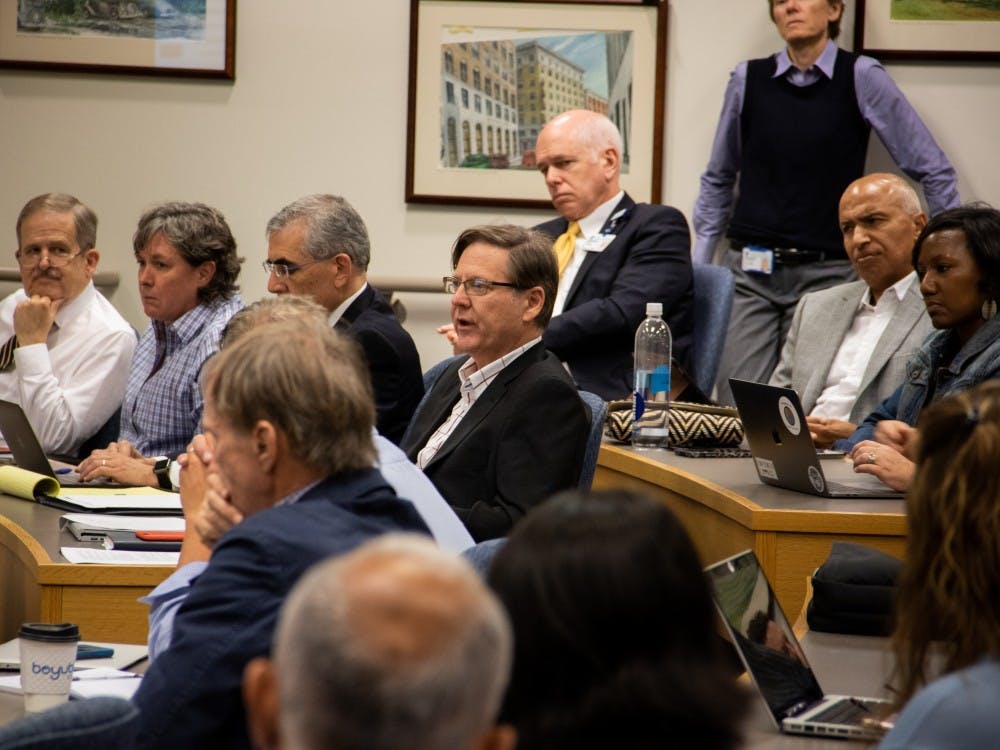Thursday’s Academic Council meeting featured several presentations on subjects ranging from Duke’s response to recent high-profile settlements to possible changes to the undergraduate residential experience. Here are four takeaways from the meeting:
Office of Research aims to follow a 'one Duke' mentality
Led by Lawrence Carin, vice president for research, the newly-established Office of Research aims to bring research in the medical center and on campus under one umbrella. Although research in the School of Medicine dwarfed that of on-campus departments several decades ago, Carin explained that the latter has grown steadily over the years.
The push to form the office came in response to what Carin described as a “very unfortunate event”: the University’s $112.5 million payment to the federal government as part of a research fraud lawsuit. He explained that the office still needs to fill several positions, including the role of chief of staff.
'I feel your pain': Some faculty voice frustration about research changes
Carin emphasized that, as a faculty member and prolific researcher himself, he understands frustration with more red tape. He stressed the importance of feeling a sense of responsibility for more than just “our part” of Duke’s research output.
Michael Gillespie, professor of political science and philosophy, asked about the reasoning for the requirement that faculty undergo training covering responsible conduct for research.
‘What amazes is the sense that people have that [trainings] are actually going to be successful in some form,” he said. “Fraud is not accidental; it isn’t a mistake people make; it isn’t because people don’t know things. It’s because they’re intentionally falsifying what they’re doing.”
In response, Carin emphasized the importance of learning to avoid the big “plane crashes” the University has recently experienced but acknowledged that simple training won’t change “sociopaths.”
“It is annoying; it is demeaning; it is insulting; it is necessary,” Carin said of the required trainings and other regulations.
Following $55 million settlement, educating faculty on antitrust law
Chris Lott, deputy general counsel and antitrust compliance officer, gave Academic Council members a 10-minute crash course in antitrust law.
The increased emphasis on Duke’s antitrust policies comes after the University shelled out more than $50 million to settle a class action lawsuit in May. The suit was brought by Danielle Seaman, adjunct associate in the department of radiology who was then an associate professor of radiology at Duke, who alleged that Duke and the University of North Carolina at Chapel Hill colluded by agreeing not to hire each other’s employees.
Lott emphasized that it is unlawful to collude to fix prices and divide customers, territories or employees. He added that antitrust laws often affect the more commercial aspects of Duke —such as competition for contracts or research funds—as opposed to academic or research collaborations.
He discouraged talking to faculty from different universities about tuition and financial aid plans, employee salary and benefits or bidding plans for future endeavors.
Changes coming to undergraduate life?
Mary Pat McMahon, vice president/vice provost for campus life, and Gary Bennett, vice provost for undergraduate education, presented the conclusions from a Board of Trustees task force tasked with examining Duke’s undergraduate residential life.
Bennett said that the biggest takeaway was the small size of Duke’s houses and the predominance of affinity-seeking on campus—such as joining a selective living group or Greek organization. This is a departure from the residential college systems offered by several peer universities, he explained.
Now, a faculty steering committee will be tasked with making changes to the model to increase faculty engagement. Bennett explained that they’ll consider two of the task force’s considerations: installing a faculty-in-residence program on West Campus and forming a faculty fellows program.
Warren Grill, professor of biomedical engineering, expressed concern about perceived cliquiness among first-year students in pre-orientation programs before most of their classmates even arrive on campus.
McMahon acknowledged his concerns, explaining that she is interested in exploring alternatives to current pre-orientation programs.
“I’m very interested in moving on the idea of a common, experiential orientation program that supplants pre-orientation so that everybody’s doing something together,” McMahon said.
Get The Chronicle straight to your inbox
Signup for our weekly newsletter. Cancel at any time.

